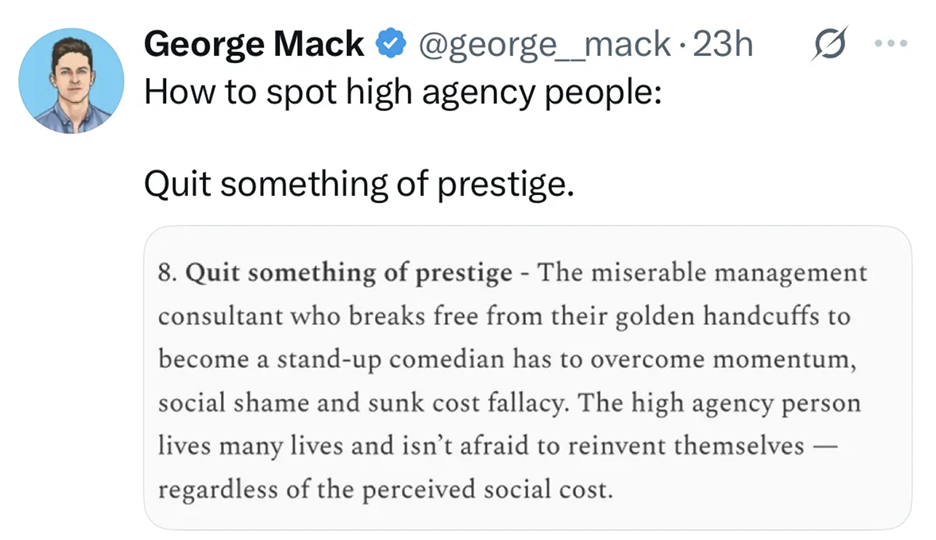Discoveries #18 | Health is the New Wealth

Welcome to Edition 18 of Discoveries. Each week, I share inspiration on design, product building, and what's next.
Health is the New Wealth
I don’t know if it’s a San Francisco thing, but lately it feels like the hottest flex isn’t your new car or your company valuation—it’s your health protocol.
“What IV treatments are you on?”
“How dialed is your supplement stack?”
“How’s your sleep score trending these days?”
Health is becoming the new status symbol. And honestly? I don’t hate it.
Growing up in the nineties, being health-conscious was the opposite of cool. The only places I could even get access to junk food was sneaking away to friends houses, where I’d have to beg my friends to not tell my parents that I had a snickers bar.
Last week, I decided to see what the hype is about and test a couple popular health diagnostic products: Superpower and BodySpec Dexa Scan.
The Dexa scan costs about $60, takes five minutes, and spits out instant results. You walk out with a full printout of your bone density, muscle mass, fat percentage—the whole “how’s your chassis holding up” report card.
Superpower is $199, plus I shelled out another $99 to have a nurse come to my house and take my blood. (Way better than awkwardly rolling up your sleeve in a strip-mall clinic)
It took about five days for results, but when they landed, it was thorough—100+ biomarkers plus a custom action plan with recommendations for diet, lifestyle, and supplements.
Were either of these experiences life-altering? Not exactly. But I’m glad I did them. More than anything, it got me thinking about where health care is headed—especially with AI woven into everything and consumer expectations for well-designed experiences only ratcheting up.
Here’s where I see it going:
AI Doctors Start to Emerge
I predict it won’t be very long until full blown AI primary care doctors start to emerge. Your AI doc will know your entire health history and never goes on vacation. (To be honest, I suspect my current doctor is already asking ChatGPT my questions anyway.)
These AI docs won’t just give generic advice—they’ll be able to cross-reference your genetic profile, lab results, and sleep data to give hyper-specific guidance. Imagine pinging your AI doc for instant help at 2 a.m. without waiting three weeks for an appointment. And unlike most human doctors, it’ll actually remember what you told it last year.
Wearables Become Free
Soon, many wearable companies will practically be paying us to strap their gadgets on, because the real gold is in our health data. Devices will get so precise they’ll buzz at you mid-meeting like, “Hey, your cortisol’s spiking—maybe take a break from Slack for a few hours.”
They’ll also start predicting issues before you even feel them, like warning you about dehydration hours before you get a headache. In other words, the line between “fitness tracker” and “personal early-warning system” will blur—and once that happens, everyone will want one.
Billionaire Care for Everyone
What used to cost tens of thousands of dollars and a trip to some private clinic in Malibu will drop to a couple hundred bucks a year. Yesterday’s “luxury” will become tomorrow’s baseline. Think personalized nutrition plans, preventative screenings, and concierge-level care—delivered at scale through apps and AI.
It’ll be like Costco meets healthcare: bulk discounts on life extension. And when that happens, the idea of only the ultra-wealthy having access to precision medicine will feel as outdated as smoking on airplanes.
The Next Breakout Health Company
Right now, my health data is scattered across half a dozen trackers—Apple Watch, Eight Sleep, Superpower diagnostics, Dexa scan—you name it. What I don’t have is a single source of truth. Whoever builds the platform that unifies all of this and delivers personalized recommendations in plain English? That’s the next trillion-dollar company.
It won’t just be about dashboards—it’ll be a health operating system that nudges you toward better decisions every day without feeling like homework. The company that cracks that will make Apple Health look like a sticky note on your fridge.
Product Inspiration

This site is pure joy. The cars, the novel site interaction, the unpretentious copywriting — all of it comes together so well.
(And now I want to buy one of their cars, damn.)
What I'm Reading
What I Wish Someone Had Told Me (by Sam Altman)
- Optimism, obsession, self-belief, raw horsepower and personal connections are how things get started.
- Cohesive teams, the right combination of calmness and urgency, and unreasonable commitment are how things get finished. Long-term orientation is in short supply; try not to worry about what people think in the short term, which will get easier over time.
- It is easier for a team to do a hard thing that really matters than to do an easy thing that doesn’t really matter; audacious ideas motivate people.
- Incentives are superpowers; set them carefully.
- Concentrate your resources on a small number of high-conviction bets; this is easy to say but evidently hard to do. You can delete more stuff than you think.
- Communicate clearly and concisely.
- Fight bullshit and bureaucracy every time you see it and get other people to fight it too. Do not let the org chart get in the way of people working productively together.
- Outcomes are what count; don’t let good process excuse bad results.
- Spend more time recruiting. Take risks on high-potential people with a fast rate of improvement. Look for evidence of getting stuff done in addition to intelligence.
- Superstars are even more valuable than they seem, but you have to evaluate people on their net impact on the performance of the organization.
- Fast iteration can make up for a lot; it’s usually ok to be wrong if you iterate quickly. Plans should be measured in decades, execution should be measured in weeks.
- Don’t fight the business equivalent of the laws of physics.
- Inspiration is perishable and life goes by fast. Inaction is a particularly insidious type of risk.
- Scale often has surprising emergent properties.
- Compounding exponentials are magic. In particular, you really want to build a business that gets a compounding advantage with scale.
- Get back up and keep going.
- Working with great people is one of the best parts of life.
Other Finds

Have a great week,
Blake
P.S. I'm always looking for feedback. Reply and let me know what you think! (I reply to every email)
Forwarded this email? Sign up here
Let's connect on LinkedIn